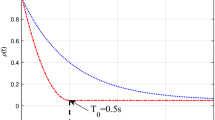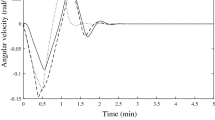Abstract
The problem of fast finite-time attitude tracking quantized control is addressed for rigid spacecraft in the paper. With the help of the backstepping technique, hysteresis quantizer and the finite-time control scheme, a novel fast finite-time attitude controller is proposed. The modified Rodriguze parameters (MRPs) are used to describe the dynamic and kinematic equations of rigid spacecraft system. Then by utilizing Lagrange theorem, rigid spacecraft attitude system is transformed into a common strict feedback system. Next, a new coordinate transformation is introduced, which will be used in the presented controller. Based on the backstepping strategy, the sufficient conditions for the existence of the fast finite-time controller are presented. Theoretical analysis shows that the attitude tracking errors rapidly converge to the equilibrium point within finite time. Meanwhile, all the signals of the close-loop system are bounded. Simulation results demonstrate the effectiveness of the proposed approach.
Similar content being viewed by others
References
E. Sharifi and C. J. Damaren, “Nonlinear optimal approach to spacecraft attitude control using magnetic and impulsive actuations,” Journal of Guidance, Control, and Dynamics, vol. 43, no. 8, pp, 1–10, 2020.
Q. Hu and X. Tan, “Dynamic near-optimal control allocation for spacecraft attitude control using a hybrid configuration of actuators,” IEEE Transactions on Aerospace and Electronic Systems, vol. 56, no. 2, pp. 1430–1443, 2020.
C. Wang, L. Guo, C. Wen, Q. L. Hu, and Z. Qiao, “Event-triggered adaptive attitude tracking control for spacecraft with unknown actuator faults,” IEEE Transactions on Industrial Electronics, vol. 67, no. 3, pp. 2241–2250, 2020.
Q. L. Hu, Y. Y. Liu, H. Y. Dong, and Y. M. Zhang, “Saturated attitude control for rigid spacecraft under attitude constraints,” Journal of Guidance, Control, and Dynamics, vol. 43, no. 9, pp. 1–16, 2020.
X. F. Zhang, T. Xu, and C. S. Wei, “Novel finite-time attitude control of postcapture spacecraft with input faults and quantization,” Advances in Space Research, vol. 65, no. 1, pp. 297–311, 2020.
C. Jammazi, “Backstepping and partial asymptotic stabilization: Applications to partial attitude control,” International Journal of Control, Automation, and Systems, vol. 6, no. 6, pp. 600–605, 2009.
E. Sharifi and C. J. Damaren, “Nonlinear optimal approach to spacecraft attitude control using magnetic and impulsive actuations,” Journal of Guidance, Control, and Dynamics, vol. 43, no. 8, pp. 1–10, 2020.
G. Creamer, P. Delahunt, and S. Gates, “Attitude determination and control of Clementine during lunar mapping,” Journal of Guidance, Control, and Dynamics, vol. 19, no. 3, pp. 505–511, 2015.
Z. Zhao, G. Cruz, and D. S. Bernstein, “Adaptive spacecraft attitude control using single-gimbal control moment gyroscopes without singularity avoidance,” Journal of Guidance, Control, and Dynamics, vol. 42, no. 11, pp. 2342–2355, 2019.
R. Yang and Y. Wang, “Finite-time stability analysis and H∞ control for a class of nonlinear time-delay Hamiltonian systems,” Automatica, vol. 49, no. 2, pp. 390–401, 2013.
Y. He and S. Zhang, “SMC-based synchronization of multiple inertial measurement units with application to attitude tracking control,” Mathematical Problems in Engineering, vol. 2021, Article ID 6637641, 2021.
G. Duan and T. Zhao, “Parametric output regulation using observer-based PI controllers with applications in flexible spacecraft attitude control,” Science China Information Sciences, vol. 64, no. 7, pp. 1–17, 2019.
Y. Guo, S. M. Song, and X. H. Li, “Quaternion-based finite-time control for attitude tracking of the spacecraft without unwinding,” International Journal of Control, Automation, and Systems, vol. 136, no. 6, pp. 1351–1359, 2015.
H. Du, S. Li, and C. Qian, “Finite-time attitude tracking control of spacecraft with application to attitude synchronization,” IEEE Transactions on Automatic Control, vol. 56, no. 11, pp. 2711–2717, 2011.
O. Mofid, S. Mobayen, and W. K. Wong, “Adaptive terminal sliding mode control for attitude and position tracking control of quadrotor UAVs in the existence of external disturbance,” IEEE Access, vol. 9, pp. 3428–3440, 2020.
O. Mofid, S. Mobayen, and A. Fekih, “Adaptive integraltype terminal sliding mode control for unmanned aerial vehicle under model uncertainties and external disturbances,” IEEE Access, vol. 9, pp. 53255–53265, 2021.
L. Zhao and Y. Jia, “Finite-time attitude tracking control for a rigid spacecraft using time-varying terminal sliding mode techniques,” International Journal of Control, vol. 88, no. 6, pp. 1150–1162, 2015.
W. H. Xing and S. N. Singh, “Adaptive output feedback control of a nonlinear aeroelastic structure,” Journal of Guidance, Control, and Dynamics, vol. 23, no. 6, pp. 1109–1116, 2000.
X. Yu and Y. Lin, “Adaptive backstepping quantized control for a class of nonlinear systems,” IEEE Transactions on Automatic Control, vol. 62, no. 2, pp. 981–985, 2017.
D. B. Doman, B. J. Gamble, and A. D. Ngo, “Quantized control allocation of reaction control jets and aerodynamic control surfaces,” Journal of Guidance, Control, and Dynamics, vol. 32, no. 1, pp. 13–24, 2009.
Z. C. Wang, “Quantized H fault-tolerant control for networked control systems,” International Journal of Automation & Computing, vol. 9, no. 4, pp. 352–357, 2012.
H. Liu, M. Cao, and D. P. Claudio, “Quantization effects on synchronized motion of teams of mobile agents with second-order dynamics,” Systems & Control Letters, vol. 61, no. 12, pp. 1157–1167, 2012.
H. Du and S. Li, “Finite-time cooperative attitude control of multiple spacecraft using terminal sliding mode control technique,” International Journal of Modelling Identification & Control, vol. 16, no. 4, pp. 327–333, 2012.
X. Hu, “Global finite-time stability for fractional-order neural networks,” Optical Memory and Neural Networks, vol. 29, no. 2, pp. 77–79, 2020.
C. Qian and W. Lin, “A continuous feedback approach to global strong stabilization of nonlinear systems,” IEEE Transactions on Automatic Control, vol. 46, no. 7, pp. 1061–1079, 2001.
D. Seo and M. R. Akella, “Separation property for the rigid-body attitude tracking control problem,” Journal of Guidance, Control, and Dynamics, vol. 30, no. 6, pp. 1569–1576, 2012.
S. Li, S. Ding, and Q. Li, “Global set stabilization of the spacecraft attitude control problem based on quaternion,” IFAC Proceedings Volumes, vol. 41, no. 2, pp. 4743–47438, 2008.
J. Qiao, Z. Liu, and L. I. Wenshuo, “Anti-disturbance attitude control of combined spacecraft with enhanced control allocation scheme,” Chinese Journal of Aeronautics, vol. 149, no. 8, pp. 110–120, 2018.
S. Yu, X. Yu, and B. Shirinzadeh, “Continuous finite-time control for robotic manipulators with terminal sliding mode,” Automatica, vol. 41, no. 11, pp. 1957–1964, 2005.
Q. Y. Xiao, Z. H. Wu, and L. Peng, “Fast finite-time consensus tracking of heterogeneous multi-agent systems with a virtual leader,” Applied Mechanics and Materials, vol. 687, no. 691, pp. 580–586, 2014.
S. Sui, C. L. P. Chen, and S. Tong, “Finite-time adaptive quantized control of stochastic nonlinear systems with input quantization: A broad learning system based identification method,” IEEE Transactions on Industrial Electronics, vol. 67, no. 10, pp. 8555–8565, 2020.
I. Ali, G. Radice, and J. Kim, “Backstepping control design with actuator torque bound for spacecraft attitude maneuver,” Journal of Guidance, Control, and Dynamics, vol. 33, no. 1, pp. 254–259, 2010.
G. W. Zhang, P. Yang, and J. Wang, “Integrated observer-based fixed-time control with backstepping method for exoskeleton robot,” International Journal of Automation and Computing, vol. 17, no.1, pp. 71–82, 2020.
Author information
Authors and Affiliations
Corresponding author
Additional information
Man Yu received her B.S. degree from University of Science and Technology Liaoning in 2019. Her research interests include nonlinear control, finite-time control, fixed-time control, quantized control, and spacecraft attitude tracking control.
Ming Chen received her B.Sc. degree in automation from Anshan Iron and Steel Institute, Anshan, China, an M.Sc. degree in control theory and control engineering from University of Science and Technology Liaoning, Anshan, China, and a Ph.D. degree in control theory and control engineering from University of Science and Technology Beijing, Beijing, China, in 2000, 2004 and 2009, respectively. She is currently a professor with the School of Electronic and Information Engineering, University of Science and Technology Liaoning, Anshan, China. Her research interests include nonlinear control systems, robust control, and fault tolerant control.
Libing Wu received his B.S. and M.S. degrees from the Department of Mathematics from Jinzhou Normal College, Jinzhou, China, in 2004, and in basic mathematics from Northeastern University, Shenyang, China, in 2007, respectively, and a Ph.D. degree in control theory and control engineering from Northeastern University, Shenyang, China, in 2016. He is currently an Associate Professor at the School of Science, University of Science and Technology Liaoning, and also as a Postdoctoral Fellow at the Department of Electrical Engineering, Yeungnam University. His research interests include adaptive control, fault-tolerant control, nonlinear control, and fault estimation.
Publisher’s Note
Springer Nature remains neutral with regard to jurisdictional claims in published maps and institutional affiliations.
Rights and permissions
About this article
Cite this article
Yu, M., Chen, M. & Wu, L. Fast Finite-time Attitude Tracking Control of Rigid Spacecraft with Quantized Input Signals. Int. J. Control Autom. Syst. 20, 1926–1934 (2022). https://doi.org/10.1007/s12555-020-0879-6
Received:
Revised:
Accepted:
Published:
Issue Date:
DOI: https://doi.org/10.1007/s12555-020-0879-6




